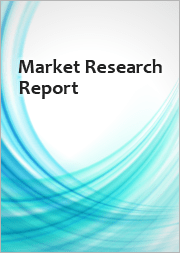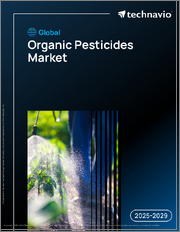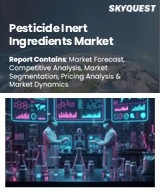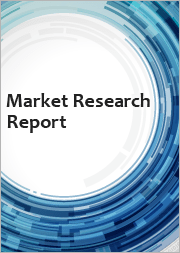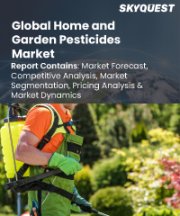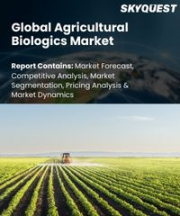
|
시장보고서
상품코드
1530817
농약 시장 예측(-2030년) : 유형별, 작물 유형별, 제형별, 작용기서별, 용도별, 지역별 분석Pesticides Market Forecasts to 2030 - Global Analysis By Type (Insecticides, Herbicides, Fungicides, Rodenticides, Nematicides and Other Types), Crop Type, Formulation, Mode Of Action, Application and By Geography |
||||||
Stratistics MRC에 따르면 세계 농약 시장은 2024년 473억 5,000만 달러로 예측 기간 동안 9.5%의 CAGR로 성장하여 2030년에는 906억 5,000만 달러에 달할 것으로 예상됩니다.
농약은 농작물, 가축 또는 인간의 건강에 해를 끼치는 해충을 예방, 방제 및 방제하는 데 사용되는 화학제품 또는 생물학적 제제입니다. 농약은 농작물의 품질과 안전성을 유지하여 농작물 손실을 줄이고 식품 매개 질병의 위험을 줄이는 데 도움이됩니다. 농약은 또한 농부들이 다양한 환경에서 다양한 작물을 재배할 수 있게 해줍니다.
환경보호청(EPA) 자료에 따르면, 인도 정부는 종합적 해충관리(IPM)의 일환으로 문화적, 기계적, 생물학적 해충 방제 방법을 이용한 생물학적 살충제 사용을 시작했으며, IPM은 중앙종합해충관리센터(CIPMCs)가 농부학교(Farmers Field Schools) 및 교육 등의 프로그램을 통해 추진하고 있습니다.
현대식 농업 기술 도입 확대
정밀 농업, 종합 병해충 관리 등 현대 농업 기술의 도입이 진행됨에 따라 해충 방제의 효율성도 향상되고 있습니다. 정밀 농업은 기술을 이용해 해충을 보다 정확하게 겨냥하고 농약 사용량을 줄이는 동시에 작물 수확량을 향상시킵니다. 종합적인 해충 관리는 화학적, 생물학적, 문화적 방법을 결합하여 해충 방제를 최적화하고 환경에 미치는 영향을 최소화합니다. 이러한 첨단 기술은 농약 살포의 효과를 높이고 더 높은 생산성을 지원하기 위해 혁신적이고 맞춤형 농약 솔루션에 대한 수요가 증가하고 있습니다.
환경과 건강에 대한 우려
농약 사용은 토양과 물 오염, 비표적 종에 대한 피해, 호흡기 질환 및 암과 같은 인체 건강 문제와 같은 잠재적 위험으로 인해 환경과 건강에 대한 우려를 불러일으키고 있습니다. 이러한 우려는 규제 강화, 감시 강화, 안전한 대체품 개발 촉진으로 이어지고 있습니다. 그 결과, 규정 준수 비용 증가, 특정 제품의 가용성 감소, 유기농 및 지속가능한 농법에 대한 소비자 수요 증가로 인해 시장 성장이 저해될 수 있습니다.
농약 제제의 혁신
서방형 또는 표적 전달 시스템과 같은 첨단 제제는 해충 방제 효율을 높이고 필요한 화학 약품의 양을 줄입니다. 기술 혁신은 또한 비표적 생물에 대한 독성이 낮고 환경에 미치는 영향을 줄인 농약의 개발로 이어집니다. 이러한 발전은 지속가능한 농업 관행을 지원하고 더 엄격한 규제를 준수할 수 있도록 돕습니다. 제형 개선은 해충 저항성 등의 문제를 해결하고 농약을 보다 효과적이고 농부들에게 더 매력적으로 만들 수 있습니다. 결과적으로 이러한 혁신은 농약의 사용 확대와 시장 확대에 기여하고 있습니다.
지속가능성과 유기농업의 트렌드
유기농은 자연적 해충 방제 방법을 중시하고 기존 농약을 사용하지 않는 농업으로, 친환경적이고 건강 지향적인 제품을 찾는 소비자 수요에 힘입어 성장하고 있습니다. 이러한 변화는 농약 사용량과 시장 수요의 감소로 이어집니다. 또한, 지속가능한 관행에는 화학적 해결책이 아닌 대체 방법에 의존하는 종합적인 해충 관리가 포함되는 경우가 많습니다. 이러한 방법을 채택하는 농가가 늘어날수록 기존 농약 시장은 축소되고, 이는 이 분야의 전체 성장에 영향을 미칠 것입니다.
COVID-19의 영향
COVID-19의 대유행은 공급망에 혼란을 초래하고 생산과 유통을 지연시켜 농약 시장에 큰 영향을 미쳤습니다. 가동 중단과 규제는 농업 활동에 영향을 미쳐 특정 농약에 대한 수요를 감소시켰습니다. 반대로 이 위기는 식량 안보의 중요성을 강조하고 작물 보호 솔루션에 대한 관심을 높이는 계기가 되었습니다. 시장에서는 보다 지속가능하고 혁신적인 방제 방법으로의 전환을 볼 수 있었습니다. 전반적으로, 팬데믹은 단기적인 도전과제를 야기했던 농약 산업에서 효율성과 지속가능성을 향한 추세를 가속화했습니다.
예측 기간 동안 즉시 사용 가능한 분야가 가장 큰 비중을 차지할 것으로 예상
기성품 농약 부문은 유리한 성장을 이룰 것으로 추정됩니다. 즉시 사용 가능한 농약은 미리 혼합된 제형이며, 살포 전에 추가 준비나 희석이 필요하지 않습니다. 스프레이나 과립과 같은 편리한 형태로 소비자가 직접 적용하기 쉽습니다. 해충 방제에 이상적인 이 제품들은 일반적인 가정 및 정원 해충에 효과적인 솔루션을 제공합니다. 사용의 용이성과 빠른 효과가 주요 장점이지만, 잠재적인 위험을 피하기 위해 안전 지침을 따르는 것이 중요합니다.
농업 분야는 예측 기간 동안 가장 높은 CAGR을 기록할 것으로 예상
농업 분야는 예측 기간 동안 가장 높은 CAGR 성장을 보일 것으로 예상됩니다. 농업용 농약은 해충, 질병 및 잡초로부터 작물을 보호하는 데 사용되는 화학제품입니다. 식물에 해를 끼치는 원치 않는 유기체를 제거하여 작물의 수확량과 품질을 향상시킵니다. 그러나 그 사용은 비표적 종에 대한 잠재적 피해, 토양 건강, 수질 오염 등 환경에 미치는 영향에 대한 우려를 불러일으킵니다. 종합적 해충 관리(IPM) 관행은 생태계와 인간의 건강에 미치는 부정적인 영향을 최소화하면서 효과의 균형을 맞추는 것을 목표로합니다.
가장 큰 점유율을 차지하는 지역:
아시아태평양은 농업 활동의 증가, 식량 안보에 대한 수요 증가, 작물 보호 기술의 발전으로 인해 예측 기간 동안 가장 큰 시장 점유율을 차지할 것으로 예상됩니다. 이러한 성장을 촉진하는 주요 요인으로는 경작지 면적의 확대, 현대식 농법 채택, 농업 개발을 지원하기 위한 정부의 노력 등이 있습니다. 중국, 인도와 같은 국가들이 시장을 독점하고 있으며, 수확량 향상과 해충 저항성 관리에 주력하고 있습니다. 또한, 친환경 농법에 대한 관심이 높아지면서 바이오 농약과 지속가능한 솔루션으로의 전환이 이루어지고 있습니다.
CAGR이 가장 높은 지역:
북미는 선진 농업 관행, 높은 작물 수확량 수요, 정밀 농업 기술 채택 증가로 인해 예측 기간 동안 가장 높은 CAGR을 보일 것으로 예상됩니다. 미국과 캐나다의 엄격한 규제 프레임워크는 제품 개발 및 승인에 영향을 미치고 있습니다. 이 지역의 주요 기업으로는 바이엘, 코테바, 신젠타 등이 있습니다. 시장은 또한 유기농업과 지속가능한 농업의 트렌드에 영향을 받고 있습니다. 전반적으로 효율적이고 친환경적인 해충 방제 방법에 대한 수요 증가가 성장을 견인하고 있습니다.
무료 맞춤형 서비스:
이 보고서를 구독하는 고객은 다음과 같은 무료 맞춤화 옵션 중 하나를 사용할 수 있습니다.
- 기업 개요
- 추가 시장 기업의 종합적인 프로파일링(최대 3개사까지)
- 주요 기업 SWOT 분석(최대 3개사까지)
- 지역 세분화
- 고객의 관심에 따른 주요 국가별 시장 추정치, 예측, CAGR(주: 타당성 검토에 따른)
- 경쟁사 벤치마킹
- 제품 포트폴리오, 지리적 입지, 전략적 제휴를 기반으로 한 주요 기업 벤치마킹
목차
제1장 주요 요약
제2장 서문
- 개요
- 이해관계자
- 조사 범위
- 조사 방법
- 데이터 마이닝
- 데이터 분석
- 데이터 검증
- 조사 접근법
- 조사 정보 출처
- 1차 조사 정보 출처
- 2차 조사 정보 출처
- 가정
제3장 시장 동향 분석
- 성장 촉진요인
- 성장 억제요인
- 기회
- 위협
- 용도 분석
- 신흥 시장
- COVID-19의 영향
제4장 Porter's Five Forces 분석
- 공급 기업의 교섭력
- 구매자의 교섭력
- 대체품의 위협
- 신규 참여업체의 위협
- 경쟁 기업 간의 경쟁 관계
제5장 세계의 농약 시장 : 유형별
- 살충제
- 제초제
- 살균제
- 살서제
- 살선충제
- 기타 유형
제6장 세계의 농약 시장 : 작물 유형별
- 곡류·곡물
- 과일·야채
- 지방종자·두류
- 기타 작물 유형
제7장 세계의 농약 시장 : 제형별
- 액체
- 분말
- 농축액
- RTU
제8장 세계의 농약 시장 : 작용기서별
- 침투
- 접촉
- 잔류
- 기타 작용기서
제9장 세계의 농약 시장 : 용도별
- 농업
- 산업
- 원예
- 수산양식업
- 기타 용도
제10장 세계의 농약 시장 : 지역별
- 북미
- 미국
- 캐나다
- 멕시코
- 유럽
- 독일
- 영국
- 이탈리아
- 프랑스
- 스페인
- 기타 유럽
- 아시아태평양
- 일본
- 중국
- 인도
- 호주
- 뉴질랜드
- 한국
- 기타 아시아태평양
- 남미
- 아르헨티나
- 브라질
- 칠레
- 기타 남미
- 중동 및 아프리카
- 사우디아라비아
- 아랍에미리트
- 카타르
- 남아프리카공화국
- 기타 중동 및 아프리카
제11장 주요 발전
- 계약, 파트너십, 협업, 합작투자
- 인수와 합병
- 신제품 발매
- 사업 확대
- 기타 주요 전략
제12장 기업 개요
- BASF SE
- Bayer AG
- Syngenta
- Corteva Agriscience
- FMC Corporation
- ADAMA Agricultural Solutions
- Nufarm Limited
- Sumitomo Chemical
- UPL Limited
- Arysta LifeScience
- Cheminova
- Albaugh LLC
- Sapec Agro
- Dow AgroSciences
- Monsanto
- Best Agrolife Limited
According to Stratistics MRC, the Global Pesticides Market is accounted for $47.35 billion in 2024 and is expected to reach $90.65 billion by 2030 growing at a CAGR of 9.5% during the forecast period. Pesticides are chemicals or biological agents used to prevent, control, or eliminate pests that harm crops, livestock, or human health. They help reduce crop losses and lower the risk of food borne illnesses by maintaining the quality and safety of produce. Pesticides also enable farmers to grow a wider variety of crops in diverse environments.
According to the Environmental Protection Agency (EPA) data, India Government has initiated the use of bioinsecticides as part of Integrated Pest Management (IPM), employing cultural, mechanical, and biological pest control methods. It is promoted by Central Integrated Pest Management Centers (CIPMCs) through programs like Farmers Field Schools and training initiatives.
Market Dynamics:
Driver:
Increasing adoption of modern farming techniques
Increasing adoption of modern farming techniques, such as precision agriculture and integrated pest management, enhances pest control efficiency. Precision agriculture uses technology to target pests more accurately, reducing overall pesticide use while improving crop yields. Integrated pest management combines chemical, biological, and cultural methods to optimize pest control and minimize environmental impact. These advanced techniques increase the effectiveness of pesticide applications and support higher productivity, thereby boosting demand for innovative and tailored pesticide solutions.
Restraint:
Environmental and health concerns
Environmental and health concerns arise from pesticide use due to potential risks such as contamination of soil and water, harm to non-target species, and human health issues like respiratory problems and cancer. These concerns lead to stricter regulations, increased scrutiny, and the push for safer alternatives. As a result, market growth can be hampered by higher compliance costs, reduced availability of certain products, and consumer demand for organic and sustainable farming practices.
Opportunity:
Innovations in pesticide formulations
Advanced formulations, such as slow-release or targeted delivery systems, increase pest control efficiency and reduce the volume of chemicals needed. Innovations also lead to the development of pesticides with lower toxicity to non-target organisms and reduced environmental impact. These advancements support sustainable agricultural practices and comply with stricter regulations. Improved formulations also address challenges like pest resistance, making pesticides more effective and appealing to farmers. Consequently, these innovations contribute to increased adoption and market expansion.
Threat:
Sustainability and organic farming trends
Organic farming emphasizes natural pest control methods and avoids conventional pesticides, driven by consumer demand for eco-friendly and health-conscious products. This shift leads to a decrease in pesticide usage and market demand. Additionally, sustainable practices often involve integrated pest management, which relies on alternative methods rather than chemical solutions. As more farmers adopt these practices, the market for traditional pesticides contracts, impacting overall growth in the sector.
Covid-19 Impact
The covid-19 pandemic significantly impacted the pesticides market by disrupting supply chains, causing delays in production and distribution. Lockdowns and restrictions affected agricultural activities and reduced demand for certain pesticides. Conversely, the crisis highlighted the importance of food security, leading to increased interest in crop protection solutions. The market saw a shift towards more sustainable and innovative pest management practices. Overall, while the pandemic caused short-term challenges, it accelerated trends toward efficiency and sustainability in the pesticide industry.
The ready-to-use segment is expected to be the largest during the forecast period
The ready-to-use segment is estimated to have a lucrative growth. Ready-to-use pesticides are pre-mixed formulations that require no additional preparation or dilution before application. They come in convenient forms like sprays or granules, making them easy for consumers to apply directly to affected areas. Ideal for immediate pest control, these products offer effective solutions for common household and garden pests. Their ease of use and quick action are key benefits, though it's important to follow safety instructions to avoid potential hazards.
The agricultural segment is expected to have the highest CAGR during the forecast period
The agricultural segment is anticipated to witness the highest CAGR growth during the forecast period. Pesticides in agricultural applications are chemicals used to protect crops from pests, diseases, and weeds. They enhance crop yield and quality by controlling unwanted organisms that can damage plants. However, their use raises concerns about environmental impact, including potential harm to non-target species, soil health, and water contamination. Integrated Pest Management (IPM) practices aim to balance effectiveness with minimizing negative effects on ecosystems and human health.
Region with largest share:
Asia Pacific is projected to hold the largest market share during the forecast period due to increasing agricultural activities, rising demand for food security, and advancements in crop protection technologies. Key factors driving this growth include expanding arable land, adoption of modern farming practices, and government initiatives supporting agricultural development. Countries like China and India dominate the market, with a strong focus on enhancing yield and managing pest resistance. The market is also witnessing a shift towards bio-pesticides and sustainable solutions, reflecting a growing emphasis on eco-friendly practices.
Region with highest CAGR:
North America is projected to have the highest CAGR over the forecast period, owing to advanced agricultural practices, high crop yield demands, and increasing adoption of precision farming technologies. Regulatory frameworks in the U.S. and Canada are stringent, impacting product development and approval. Key players in the region include Bayer, Corteva, and Syngenta. The market is also influenced by trends in organic farming and sustainable agriculture. Overall, growth is supported by increasing demand for efficient and environmentally friendly pest control methods.
Key players in the market
Some of the key players profiled in the Pesticides Market include BASF SE, Bayer AG, Syngenta, Corteva Agriscience, FMC Corporation, ADAMA Agricultural Solutions, Nufarm Limited, Sumitomo Chemical, UPL Limited, Arysta LifeScience, Cheminova, Albaugh LLC, Sapec Agro, Dow AgroSciences, Monsanto and Best Agrolife Limited.
Key Developments:
In June 2024, Best Agrolife Ltd has launched its new patented insecticide formulation named Nemagen, designed to combat resistant pests causing significant crop damage. Nemagen contains a combination of active ingredients chlorantraniliprole, novaluron and emamectin benzoate to provide broad-spectrum control of lepidopteran, coleoptera and diptera pests affecting vegetables, grains, fruits and pulses.
In May 2024, BASF has launched Efficon, a new insecticide, in India to help farmers tackle sucking pests. Classified under the new IRAC group 36, the product represents a new class of insecticides (Group 36 - pyridazine) with no known cross-resistance with existing products, making it a superior insecticide resistance management tool.
Types Covered:
- Insecticides
- Herbicides
- Fungicides
- Rodenticides
- Nematicides
- Other Types
Crop Types Covered:
- Cereal & Grains
- Fruits & Vegetables
- Oilseeds & Pulses
- Other Crop Types
Formulations Covered:
- Liquid
- Powder
- Concentrate
- Ready-to-Use
Mode Of Actions Covered:
- Systemic
- Contact
- Residual
- Other Mode Of Actions
Applications Covered:
- Agricultural
- Industrial
- Horticulture
- Aquaculture
- Other Applications
Regions Covered:
- North America
- US
- Canada
- Mexico
- Europe
- Germany
- UK
- Italy
- France
- Spain
- Rest of Europe
- Asia Pacific
- Japan
- China
- India
- Australia
- New Zealand
- South Korea
- Rest of Asia Pacific
- South America
- Argentina
- Brazil
- Chile
- Rest of South America
- Middle East & Africa
- Saudi Arabia
- UAE
- Qatar
- South Africa
- Rest of Middle East & Africa
What our report offers:
- Market share assessments for the regional and country-level segments
- Strategic recommendations for the new entrants
- Covers Market data for the years 2022, 2023, 2024, 2026, and 2030
- Market Trends (Drivers, Constraints, Opportunities, Threats, Challenges, Investment Opportunities, and recommendations)
- Strategic recommendations in key business segments based on the market estimations
- Competitive landscaping mapping the key common trends
- Company profiling with detailed strategies, financials, and recent developments
- Supply chain trends mapping the latest technological advancements
Free Customization Offerings:
All the customers of this report will be entitled to receive one of the following free customization options:
- Company Profiling
- Comprehensive profiling of additional market players (up to 3)
- SWOT Analysis of key players (up to 3)
- Regional Segmentation
- Market estimations, Forecasts and CAGR of any prominent country as per the client's interest (Note: Depends on feasibility check)
- Competitive Benchmarking
- Benchmarking of key players based on product portfolio, geographical presence, and strategic alliances
Table of Contents
1 Executive Summary
2 Preface
- 2.1 Abstract
- 2.2 Stake Holders
- 2.3 Research Scope
- 2.4 Research Methodology
- 2.4.1 Data Mining
- 2.4.2 Data Analysis
- 2.4.3 Data Validation
- 2.4.4 Research Approach
- 2.5 Research Sources
- 2.5.1 Primary Research Sources
- 2.5.2 Secondary Research Sources
- 2.5.3 Assumptions
3 Market Trend Analysis
- 3.1 Introduction
- 3.2 Drivers
- 3.3 Restraints
- 3.4 Opportunities
- 3.5 Threats
- 3.6 Application Analysis
- 3.7 Emerging Markets
- 3.8 Impact of Covid-19
4 Porters Five Force Analysis
- 4.1 Bargaining power of suppliers
- 4.2 Bargaining power of buyers
- 4.3 Threat of substitutes
- 4.4 Threat of new entrants
- 4.5 Competitive rivalry
5 Global Pesticides Market, By Type
- 5.1 Introduction
- 5.2 Insecticides
- 5.3 Herbicides
- 5.4 Fungicides
- 5.5 Rodenticides
- 5.6 Nematicides
- 5.7 Other Types
6 Global Pesticides Market, By Crop Type
- 6.1 Introduction
- 6.2 Cereal & Grains
- 6.3 Fruits & Vegetables
- 6.4 Oilseeds & Pulses
- 6.5 Other Crop Types
7 Global Pesticides Market, By Formulation
- 7.1 Introduction
- 7.2 Liquid
- 7.3 Powder
- 7.4 Concentrate
- 7.5 Ready-to-Use
8 Global Pesticides Market, By Mode Of Action
- 8.1 Introduction
- 8.2 Systemic
- 8.3 Contact
- 8.4 Residual
- 8.5 Other Mode Of Actions
9 Global Pesticides Market, By Application
- 9.1 Introduction
- 9.2 Agricultural
- 9.3 Industrial
- 9.4 Horticulture
- 9.5 Aquaculture
- 9.6 Other Applications
10 Global Pesticides Market, By Geography
- 10.1 Introduction
- 10.2 North America
- 10.2.1 US
- 10.2.2 Canada
- 10.2.3 Mexico
- 10.3 Europe
- 10.3.1 Germany
- 10.3.2 UK
- 10.3.3 Italy
- 10.3.4 France
- 10.3.5 Spain
- 10.3.6 Rest of Europe
- 10.4 Asia Pacific
- 10.4.1 Japan
- 10.4.2 China
- 10.4.3 India
- 10.4.4 Australia
- 10.4.5 New Zealand
- 10.4.6 South Korea
- 10.4.7 Rest of Asia Pacific
- 10.5 South America
- 10.5.1 Argentina
- 10.5.2 Brazil
- 10.5.3 Chile
- 10.5.4 Rest of South America
- 10.6 Middle East & Africa
- 10.6.1 Saudi Arabia
- 10.6.2 UAE
- 10.6.3 Qatar
- 10.6.4 South Africa
- 10.6.5 Rest of Middle East & Africa
11 Key Developments
- 11.1 Agreements, Partnerships, Collaborations and Joint Ventures
- 11.2 Acquisitions & Mergers
- 11.3 New Product Launch
- 11.4 Expansions
- 11.5 Other Key Strategies
12 Company Profiling
- 12.1 BASF SE
- 12.2 Bayer AG
- 12.3 Syngenta
- 12.4 Corteva Agriscience
- 12.5 FMC Corporation
- 12.6 ADAMA Agricultural Solutions
- 12.7 Nufarm Limited
- 12.8 Sumitomo Chemical
- 12.9 UPL Limited
- 12.10 Arysta LifeScience
- 12.11 Cheminova
- 12.12 Albaugh LLC
- 12.13 Sapec Agro
- 12.14 Dow AgroSciences
- 12.15 Monsanto
- 12.16 Best Agrolife Limited






